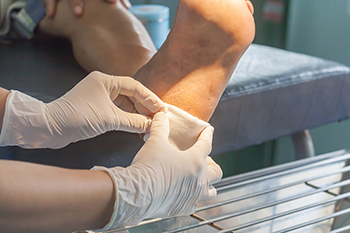Effective Foot Wound Care
Tuesday, 29 August 2023 00:00
Proper wound care for the feet is a crucial aspect of maintaining overall health and mobility. Whether managing minor cuts, blisters, or more substantial injuries, tending to foot wounds can help to prevent complications and expedite healing. Wound care can begin by cleaning the affected area gently with mild soap and lukewarm water, and patting it dry without rubbing. This can be followed by applying an appropriate antiseptic, which can help to prevent infections. Covering the wound with a sterile bandage or dressing can safeguard it from dirt and friction. It is beneficial to regularly change the dressing and monitor the wound's progress, keeping an eye out for signs of infection, such as increased redness, swelling, or pus. If the wound does not show signs of improvement or healing, seeking medical attention is essential to ensure a seamless recovery process for your feet. If you have a foot wound, it is strongly suggested that you confer with a podiatrist who can effectively treat wounds on the feet.
Wound care is an important part in dealing with diabetes. If you have diabetes and a foot wound or would like more information about wound care for diabetics, consult with John Killough, DPM from Regional Foot Center. Our doctor will assess your condition and provide you with quality foot and ankle treatment.
What Is Wound Care?
Wound care is the practice of taking proper care of a wound. This can range from the smallest to the largest of wounds. While everyone can benefit from proper wound care, it is much more important for diabetics. Diabetics often suffer from poor blood circulation which causes wounds to heal much slower than they would in a non-diabetic.
What Is the Importance of Wound Care?
While it may not seem apparent with small ulcers on the foot, for diabetics, any size ulcer can become infected. Diabetics often also suffer from neuropathy, or nerve loss. This means they might not even feel when they have an ulcer on their foot. If the wound becomes severely infected, amputation may be necessary. Therefore, it is of the upmost importance to properly care for any and all foot wounds.
How to Care for Wounds
The best way to care for foot wounds is to prevent them. For diabetics, this means daily inspections of the feet for any signs of abnormalities or ulcers. It is also recommended to see a podiatrist several times a year for a foot inspection. If you do have an ulcer, run the wound under water to clear dirt from the wound; then apply antibiotic ointment to the wound and cover with a bandage. Bandages should be changed daily and keeping pressure off the wound is smart. It is advised to see a podiatrist, who can keep an eye on it.
If you have any questions, please feel free to contact our offices located in Charleston and Effingham, IL . We offer the newest diagnostic and treatment technologies for all your foot care needs.




